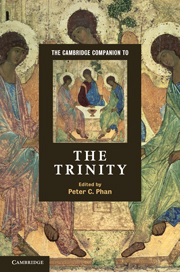Book contents
- Frontmatter
- Contents
- Notes on contributors
- Preface
- Part I Introduction
- Part II Retrieving the sources
- Part III Renewing the tradition
- Part IV Contemporary theologians
- 10 Karl Barth, reconciliation, and the Triune God
- 11 Mystery of grace and salvation: Karl Rahner's theology of the Trinity
- 12 Hans Urs von Balthasar on the Trinity
- 13 The trinitarian doctrines of Jürgen Moltmann and Wolfhart Pannenberg in the context of contemporary discussion
- 14 Sophia, apophasis, and communion: the Trinity in contemporary Orthodox theology
- 15 The life-giving reality of God from black, Latin American, and US Hispanic theological perspectives
- 16 Feminist theologies and the Trinity
- Part V In dialogue with other religions
- Part VI Systematic connections
- Index
- References
15 - The life-giving reality of God from black, Latin American, and US Hispanic theological perspectives
from Part IV - Contemporary theologians
Published online by Cambridge University Press: 28 July 2011
- Frontmatter
- Contents
- Notes on contributors
- Preface
- Part I Introduction
- Part II Retrieving the sources
- Part III Renewing the tradition
- Part IV Contemporary theologians
- 10 Karl Barth, reconciliation, and the Triune God
- 11 Mystery of grace and salvation: Karl Rahner's theology of the Trinity
- 12 Hans Urs von Balthasar on the Trinity
- 13 The trinitarian doctrines of Jürgen Moltmann and Wolfhart Pannenberg in the context of contemporary discussion
- 14 Sophia, apophasis, and communion: the Trinity in contemporary Orthodox theology
- 15 The life-giving reality of God from black, Latin American, and US Hispanic theological perspectives
- 16 Feminist theologies and the Trinity
- Part V In dialogue with other religions
- Part VI Systematic connections
- Index
- References
Summary
The doctrine of the Trinity is a signpost that points to God's mystery as a life-giving triune presence in history. God's life has been shared in history for the sake of human salvation. Thus wherever the question of creaturely life arises, the reality of God emerges as its answer. As the Latin American theologian Ignacio Ellacuría underscores, it is not so much that “God is in all things” but that “all things, each in its own way, have been grafted with the triune life and refer essentially to that life.” In this sense, trinitarian theology probes within manifold creaturely experiences “the triune life itself, however mediated, incarnated, and historicized.”
This chapter probes the triune life of God from black, Latin American, and US Hispanic perspectives. The first part of the chapter explores the fundamental relationship between God and salvation history. It underscores how black, Latin American, and US Hispanic theologies understand racial, socio-economic, and cultural marginalization as loci for understanding the life-giving manifestation of God's reality. I draw primarily from the writings of James Cone, Gustavo Gutíerrez, and Virgilio Elizondo. Each of these theologians provides distinct building-blocks in black, Latin American, and US Hispanic trinitarian reflections.
- Type
- Chapter
- Information
- The Cambridge Companion to the Trinity , pp. 259 - 273Publisher: Cambridge University PressPrint publication year: 2011
References
- 2
- Cited by



